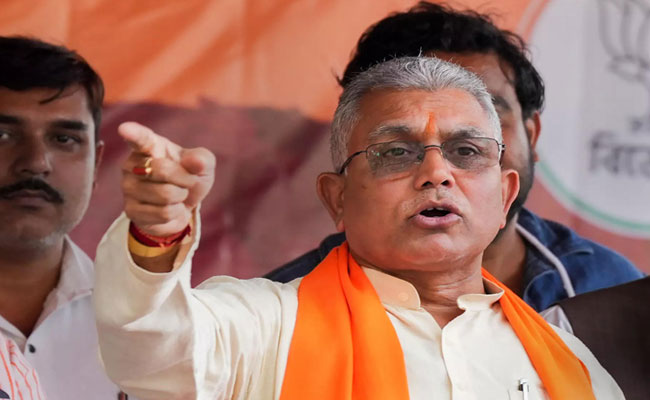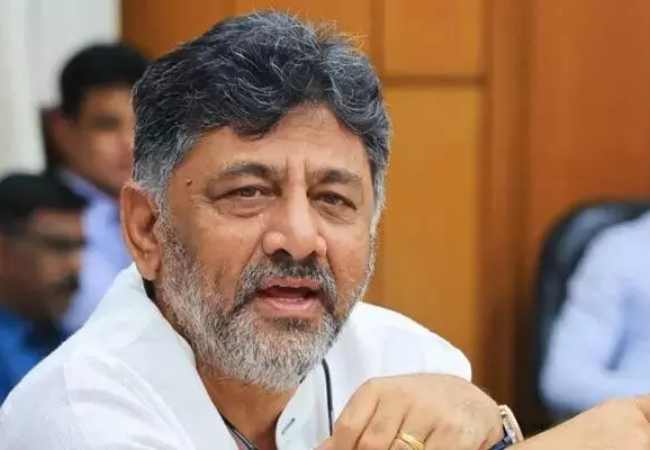Kolkata (PTI): A controversy erupted on Tuesday after senior BJP leader and MP Dilip Ghosh was heard mocking the family background of West Bengal Chief Minister Mamata Banerjee in a purported video clip.
This drew a retort from the TMC, which said the remarks by the BJP MP reflect the "DNA of the saffron camp".
The TMC shared the purported video clip in which Ghosh was heard making the remarks.
PTI, however, couldn't independently verify the authenticity of the video clip.
The former West Bengal BJP president, presently contesting from the Bardhaman-Durgapur Lok Sabha seat, mocked TMC's slogan of "Bangla Nijer Meye ke chai (Bengal wants its own daughter)".
"When she goes to Goa, she says she is the daughter of Goa. In Tripura, she says she is the daughter of Tripura. First, let her clarify...," he said.
Ghosh, the sitting MP from the Medinipur Lok Sabha seat, was referring to the TMC's 2021 poll slogan "Bangla Nijer Meyekei Chai".
The TMC is approaching the Election Commission against the BJP leader for his comment.
West Bengal Women and Child Development Minister Shashi Panja demanded an apology from Ghosh and said the comments reflect the "DNA of the saffron camp".
"He should immediately tender his apology. The comments reflect the DNA of the saffron camp, which smacks of the misogynistic mindset of the BJP. The EC must take note of it," she said.
"@DilipGhoshBJP is a disgrace in the name of political leadership! From challenging the lineage of Maa Durga to now questioning the ancestry of Smt. @MamataOfficial, he has wallowed in the filthiest depths of moral bankruptcy," the TMC posted on X.
The party also said, "One thing is crystal clear: Ghosh has zero respect for the women of Bengal, whether it be the revered goddess of Hinduism or the only woman Chief Minister of India."
The TMC had fanned the 'Bengali pride' by coming up with a poll slogan, "Bangla Nijer Meyekei Chai" and has created a poll narrative of sub-nationalism to counter BJP's identity politics in the 2021 assembly polls.
The "insider-outsider" debate in West Bengal gained strength before the assembly polls with the ruling TMC embracing Bengali sub-nationalism as its main poll plank to counter the rise of the BJP's Hindutva narrative in the state and has branded it as a "party of outsiders".
Let the Truth be known. If you read VB and like VB, please be a VB Supporter and Help us deliver the Truth to one and all.
Bengaluru (PTI): Karnataka has proposed a new Information Technology Policy for 2025–2030, offering extensive financial and non-financial incentives aimed at accelerating investments, strengthening innovation and expanding the state's tech footprint beyond Bengaluru.
The Karnataka Cabinet gave its nod to the policy 2025–2030 with an outlay of Rs 445.50 crore on Thursday after the Finance Department accorded its approval.
The policy introduces 16 incentives across five enabler categories, nine of which are entirely new, with a distinctive push to support companies setting up or expanding in emerging cities.
Alongside financial support, the government is also offering labour-law relaxations, round-the-clock operational permissions and industry-ready human capital programmes to make Karnataka a globally competitive 'AI-native' destination.
According to the policy, units located outside Bengaluru will gain access to a wide suite of benefits, including research and development and IP creation incentives, internship reimbursements, talent relocation support and recruitment assistance.
The benefits also include EPF reimbursement, faculty development support, rental assistance, certification subsidies, electricity tariff rebates, property tax reimbursement, telecom infrastructure support, and assistance for events and conferences.
Bengaluru Urban will receive a focused set of six research and development and talent-oriented incentives, while Indian Global Capability Centres (GCCs) operating in the state will be brought under the incentive net.
Incentive caps and eligibility thresholds have been raised, and the policy prioritises growth-focused investments for both new and expanding units.
Beyond incentives, the government focuses on infrastructure and innovation interventions.
A flagship proposal in the policy is the creation of Techniverse -- integrated, technology-enabled enclaves developed through a public-private partnership model inside future Global Innovation Districts.
These campuses will offer plug-and-play facilities, artificial intelligence and machine learning and cybersecurity labs, advanced testbeds, experience centres, and disaster-resistant command centres.
There will also be a Statewide Digital Hub Grid and a Global Test Bed Infrastructure Network, linking public and private research and development, and innovation facilities across Karnataka.
The government has proposed a Women Global Tech Missions Fellowship for 1,000 mid-career women technologists, an IT Talent Return Programme to absorb experienced professionals returning from abroad, and broad-based skill and faculty development reimbursements.
Shared corporate transport routes in Bengaluru and tier-two cities will be designed with Bengaluru Metropolitan Transport Corporation and other transport entities to support worker mobility.
The government said the policy is the outcome of an extensive research and consultation process involving TCS, Infosys, Wipro, IBM, HCL, Tech Mahindra, Cognizant, HP, Google, Accenture and NASSCOM, along with sector experts and stakeholder groups.
It estimates an outlay of Rs 967.12 crore over five years, comprising Rs 754.62 crore for incentives and Rs 212.50 crore for interventions such as Techniverse campuses, digital grid development, global outreach missions and talent programmes.





